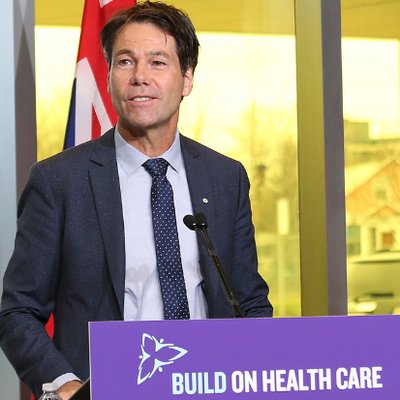Canada News
Ontario health minister resigns to lead discussion on national pharmacare plan

Hoskins himself dropped a major clue about the no-longer-so-secret plan Monday when he abruptly resigned both his cabinet position and his seat in the provincial legislature, saying he was leaving “to continue building better health care for all
Canadians” and that his “path and journey will become clearer in the days ahead.”(Photo: Dr. Eric Hoskins/Twitter)
OTTAWA – Tuesday’s federal budget will establish a national advisory group with former Ontario health minister Eric Hoskins at the helm that will work towards setting up a Canada-wide pharmacare plan, sources say.
Hoskins himself dropped a major clue about the no-longer-so-secret plan Monday when he abruptly resigned both his cabinet position and his seat in the provincial legislature, saying he was leaving “to continue building better health care for all Canadians” and that his “path and journey will become clearer in the days ahead.”
In conversations with The Canadian Press, senior government officials – speaking on condition of anonymity to discuss matters not yet made public – confirmed both the plans for a national pharmacare effort and the fact Hoskins will play a leading role.
They say the government hopes to have a plan that can be implemented in next year’s budget, just in time for the 2019 election – likely an effort to outflank the upstart NDP leader Jagmeet Singh, who has promised to make national pharmacare one of his central priorities.
Hoskins’ role as Ontario health minister has given him credibility with the provinces, which should come in handy in guiding discussions among a group of governments that has never been able to agree about what prescription drugs should be covered.
Organizations such as the Canadian Labour Congress have been urging the federal government to lay out a timeline during which they will work with provinces and territories to “design and implement a universal, comprehensive, national public prescription drug program that covers all Canadians.”
In its pre-budget recommendations, the congress said the country’s current system is an inefficient, expensive patchwork that has left 3.5 million Canadians unable to afford the medication they need. The group says Canada is the only developed country in the world with a universal health-care program that doesn’t include a universal prescription drug plan.
In a statement Monday, Hoskins gave no reason for his departure, beyond the hints about his future, and said his resignation would be effective immediately.
During his time as health minister, the Ontario government introduced a pharmacare plan that covers 4,400 medications for people under 25. The strategy, which was a key component of last year’s provincial budget, took effect in January.
Ontario Premier Kathleen Wynne thanked Hoskins for his work and said Helena Jaczek would take over as health minister.
“I am so grateful for the work Eric has done to continue improving Ontario’s world-class health care system to better support patients and their families,” Wynne said.
“He has also been instrumental in making sure Ontario is leading the effort to expand our system with historic initiatives like OHIP+, which has made prescription drugs free for everyone under the age of 25.”
The parliamentary budget watchdog calculated last fall that a national, universal pharmacare program would cost more than $19 billion, but could still slash the overall price tag for drugs in this country by more than $4 billion annually.
The savings would come largely from the impact of bulk purchases of drugs, allowing Health Canada to negotiate better prices for most pharmaceuticals, as well as an increase in the use of generic drugs.
Eliminating all out-of-pocket expenses for prescription drugs would likely help Canadians who choose not to fill or renew prescriptions, or skip doses, because of the high cost of buying medicine. A 2015 poll from Angus Reid suggested one-quarter of Canadians fall into that category.
The parliamentary budget office analysis found that in the 2015-16 fiscal year, about $28.5 billion was spent on pharmaceuticals in Canada, not including medicines provided to patients in hospitals. Provinces and the federal government paid for $13.1 billion of that, private insurance companies covered $10.7 billion and individual Canadians were on the hook for $4.7 billion.
Using lists of drugs covered by provincial health plans, the PBO decided about $24.6 billion would be eligible for coverage by a national pharmacare program. The rest was spent on drugs that are not currently covered.
Hoskins, who had been a member of the Ontario legislature since 2009 and health minister since 2014, was the fourth high-profile Ontario Liberal to step down just months ahead of a provincial election. He is a physician and a Rhodes Scholar.
The move comes roughly a month after Wynne shuffled several senior portfolios in her cabinet to prepare for the departure of three ministers who announced they would not run in the June election. Many of the ministers involved in the shuffle represented ridings in the Greater Toronto Area, which will be a key battleground in the election.
OTTAWA – Tuesday’s federal budget will establish a national advisory group with former Ontario health minister Eric Hoskins at the helm that will work towards setting up a Canada-wide pharmacare plan, sources say.
Hoskins himself dropped a major clue about the
no-longer-so-secret plan Monday when he abruptly resigned both his
cabinet position and his seat in the provincial legislature, saying
he was leaving “to continue building better health care for all
Canadians” and that his “path and journey will become clearer in
the days ahead.”
In conversations with The Canadian Press, senior government officials – speaking on condition of anonymity to discuss matters not yet made public – confirmed both the plans for a national pharmacare effort and the fact Hoskins will play a leading role.
They say the government hopes to have a plan that can be implemented in next year’s budget, just in time for the 2019 election – likely an effort to outflank the upstart NDP leader Jagmeet Singh, who has promised to make national pharmacare one of his central priorities.
Hoskins’ role as Ontario health minister has given him credibility with the provinces, which should come in handy in guiding discussions among a group of governments that has never been able to agree about what prescription drugs should be covered.
Organizations such as the Canadian Labour Congress have been urging the federal government to lay out a timeline during which they will work with provinces and territories to “design and implement a universal, comprehensive, national public prescription drug program that covers all Canadians.”
In its pre-budget recommendations, the congress said the country’s current system is an inefficient, expensive patchwork that has left 3.5 million Canadians unable to afford the medication they need. The group says Canada is the only developed country in the world with a universal health-care program that doesn’t include a universal prescription drug plan.
In a statement Monday, Hoskins gave no reason for his departure, beyond the hints about his future, and said his resignation would be effective immediately.
During his time as health minister, the Ontario government introduced a pharmacare plan that covers 4,400 medications for people under 25. The strategy, which was a key component of last year’s provincial budget, took effect in January.
Ontario Premier Kathleen Wynne thanked Hoskins for his work and said Helena Jaczek would take over as health minister.
“I am so grateful for the work Eric has done to continue improving Ontario’s world-class health care system to better support patients and their families,” Wynne said.
“He has also been instrumental in making sure Ontario is leading the effort to expand our system with historic initiatives like OHIP+, which has made prescription drugs free for everyone under the age of 25.”
The parliamentary budget watchdog calculated last fall that a national, universal pharmacare program would cost more than $19 billion, but could still slash the overall price tag for drugs in this country by more than $4 billion annually.
The savings would come largely from the impact of bulk purchases of drugs, allowing Health Canada to negotiate better prices for most pharmaceuticals, as well as an increase in the use of generic drugs.
Eliminating all out-of-pocket expenses for prescription drugs would likely help Canadians who choose not to fill or renew prescriptions, or skip doses, because of the high cost of buying medicine. A 2015 poll from Angus Reid suggested one-quarter of Canadians fall into that category.
The parliamentary budget office analysis found that in the 2015-16 fiscal year, about $28.5 billion was spent on pharmaceuticals in Canada, not including medicines provided to patients in hospitals. Provinces and the federal government paid for $13.1 billion of that, private insurance companies covered $10.7 billion and individual Canadians were on the hook for $4.7 billion.
Using lists of drugs covered by provincial health plans, the PBO decided about $24.6 billion would be eligible for coverage by a national pharmacare program. The rest was spent on drugs that are not currently covered.
Hoskins, who had been a member of the Ontario legislature since 2009 and health minister since 2014, was the fourth high-profile Ontario Liberal to step down just months ahead of a provincial election. He is a physician and a Rhodes Scholar.
The move comes roughly a month after Wynne shuffled several senior portfolios in her cabinet to prepare for the departure of three ministers who announced they would not run in the June election. Many of the ministers involved in the shuffle represented ridings in the Greater Toronto Area, which will be a key battleground in the election.





















